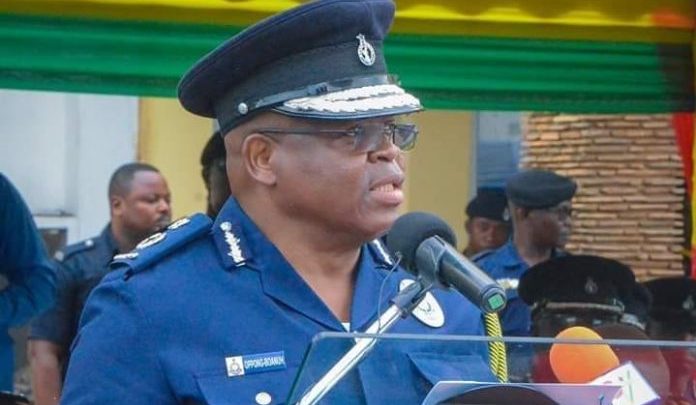GENERAL NEWS
Election Petition: Deepening Ghana’s Democratic tenets processes through Election — Save Ghana Foundation.

Twenty eight years on, Ghana has deepened not just her electoral process but it developing democracy. Having practiced a multi-party system of government over the past two decades, we have witnessed presidential elections which has resulted in a number of presidents with varying political ideologies. In all, Ghana has been the winner. In view of this, I seek to write on the 2020 presidential election petition.
The 2020 presidential election held on 7th December, 2020 and declared on December 9, 2020 by Mrs. Jean Adukwei Mensah in favour of Nana Addo Dankwa Akufo-Addo sparked some public resentments. While a section of the public have held that the election of the president was free, fair and credible, others have contrary views.
On 30th December,2020, the presidential candidate of the National Democratic Congress (NDC), John Dramani Mahama filed at the Supreme Court to contest the validity and eligibility of the president-elect. The petition was based on the following:
● that in the purported declaration made by the first respondent, Mrs. Jean Adukwei Mensa that Nana Addo Dankwa Akufo-Addo as president- elect violates article 63(3) of the 1992 constitution and is therefore unconstitutional, null and void.
● that the said declaration made by the first respondent, Mrs. Jean Adukwei Mensa, chairperson of the electoral commission and returning officer for the presidential election violated the constitutional duty imposed on her by article 23 and 296(a) in the 1992 constitution to be fair, candid and reasonable.
● that the said declaration was made without regard to due process of law as required under article 23 and 296(b) of the 1992 constitution.
● that the said declaration was done arbitrarily, capriciously and with bias in favour of the second respondent thus, Nana Addo Dankwa Akufo-Addo and contrary to article 296(b) of the1992 constitution.
The apex court “dismissed the petition because it lacked merit”. A critical look at the said verdict shows that the petitioner went to court ill-prepared and disorganized. The petition lacked the needed evidences of further and better particulars to make his case. Is it not surprising that the petitioner in his pleadings before the court claimed the second respondent never won the December 7 election and that no one attained the 50% threshold as stipulated in article 63(3) of the 1992 constitution yet there was no contrary arithmetic stated. During cross examination of the petitioner’s witnesses, none of the three could provide a computed number of votes to make up their case well enough.
As part of case management, the court together with parties settled on five issues out of the six reliefs. A number of them are as follows “whether or not the second respondent still met the article 63(3) of the 1992 constitution threshold by the exclusion or inclusion of the Techiman South constituency presidential election results”. In reference to the above, the petitioner failed to provide convincing evidence to buttress his point. As established by practice, I expected the petitioner to have furnished a calculated arithmetic from his end to show that whether or not the 125,000+ votes from Techiman South constituency if added to the his votes will make no one meet the 50% mark hence a rerun.
The second issue as established by case management was “whether or not the declaration by the first respondent, (EC) on December 9 of the presidential election conducted on December 7 was in violation of article 63(3) of the 1992 constitution”.Again, the petitioner did not provide any substance of a convincing evidence to compare and contrast the number of total valid votes cast and total number of votes cast as gazetted by the first respondent.
The supreme court in their unanimous decision noted that except the first relief or issue where a citizen that feels some satutes in Ghana have been breached means that he or she must be heard to allow the person to prove his or her claims which is right and legal hence a reasonable cause of action. The remaining four issues were shot down due to lack of convincing evidence.
The ruling noted that the petitioner and his witnesses did not provide any, evidence to convince the bench that the errors made by the chairperson of the electoral commission, Jean Adukwei Mensa, affected the 2020 presidential election results in any way to prove that President Akufo-Addo did not meet the threshold in article 63(3) of the 1992 constitution. “The petition is hereby dismissed as lacking merit” the Chief Justice and President of the seven member panel stated.
Lessons from the Petition.
In summary, the presidential election petition has pointed out the importance to prepare and organize well enough before a court of competent jurisdiction. Ghanaians have been educated on the need to provide “convincing evidences” to back a case. A court of competent jurisdiction deals with concrete evidence, facts and established details not mere fanciful tales, stories and conjectures. The major points in the verdict highlighted lack of convincing evidences. Also, the apex court of the land as part of the proceedings, interpreted our laws governing elections. A number of constitutional instruments (C.Is) and provisions in the 1992 constitution were duly explained. The most salient point I would want to mention is that the 2020 presidential election petition will go a long way to deepen our electoral process as a growing democracy.
May God bless our homeland Ghana and make us great and strong.
Article by Edward Adu-Bobi.
(Executive Secretary, Save Ghana Foundation)
Save Ghana Foundation is a non-governmental highly reputable public interest advocacy group. As part of our responsibilities is to put Ghana first not any individual, political party or whatsoever.
Motto : Posterity is Our Concern.
Source: thepressradio.com/Ofori Frimpong





